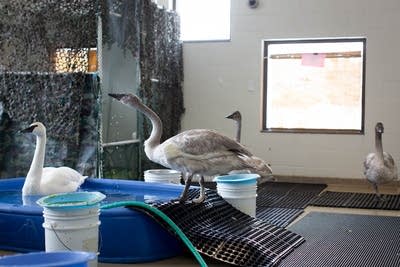Frozen lakes, deep winter take a toll on swans, other wildlife

Go Deeper.
Create an account or log in to save stories.
Like this?
Thanks for liking this story! We have added it to a list of your favorite stories.
Think this winter has been tough? Be glad you're not a duck -- or a trumpeter swan.
"Always when you grab a swan, you always want to get their wings as tight to them as possible because that is where they really beat you up," veterinarian Agnes Hutchinson said as she corralled one of about a half dozen of the birds that have made their way to the Wildlife Rehabilitation Center of Minnesota this winter.
With lakes so deeply frozen this year, the swans and other birds are having a hard time finding open water. "They have to stand on ice a lot more than they usually would have to. And that's really hard on their feet," Hutchinson said as she wrapped the bird in towels. He "probably got caught without anywhere to go and protect his feet, and he just got frostbitten."
Deep snow and record cold have taken an unusual toll on wildlife this winter, as refuges from arctic weather have completely frozen over.
Turn Up Your Support
MPR News helps you turn down the noise and build shared understanding. Turn up your support for this public resource and keep trusted journalism accessible to all.
It's a common tale all over the Midwest this winter. More swans and mallards -- even loons -- are showing up, stranded by the coldest weather in more than 30 years. In Milwaukee, along Lake Michigan, rescuers have brought six times as many diving ducks into the Wisconsin Humane Society.
Minnesota isn't seeing that kind of spike, but the winter has brought some other strange phenomenon, like a red-throated loon showing up hurt in February, said Phil Jenni, director of the wildlife rehabilitation center.
"This year, what's happened is a lot of the areas that are normally open are icing over. That's forcing those birds off of the water, and then once they get out over land, their food source is gone," Jenni said. "That's when they start to have trouble. They start to really starve to death, land in fields. And a lot of times those are the animals we're getting in right now."

Without open water, the birds are also more vulnerable to attack from raptors and other predators, and more likely to fly into power lines and other obstacles. A temporary shutdown of the Xcel Energy nuclear plant in Monticello that let the Mississippi River freeze over didn't make it any easier this year.
Mammals are better equipped than birds for the cold, said Jenni. Moose may actually do better this year because the cold may curb parasites that have been thought to have contributed to the declining population in Minnesota.
Other animals, like the opossums that have been proliferating because of warm winters, are ill prepared for arctic weather. They don't have fur on their tails or ears, making them vulnerable to frostbite.
Hutchinson, the veterinarian, said they're doing what they can for the animals that show up on their doorstep -- cutting away the dead tissue, giving them something to eat and getting them back on their feet.
She smeared the swan's feet with bag balm to keep the skin healthy while he's waiting to be released. Another vet amputated the ends of the swan's toes and cut away some of the webbing.
"When he came in, we were discussing, how much of the webbing will we have to take off. How much of the webbing does he need to swim properly?" she said. "But he still has a good amount, so we said we're going to give him a chance and we're going to try."







